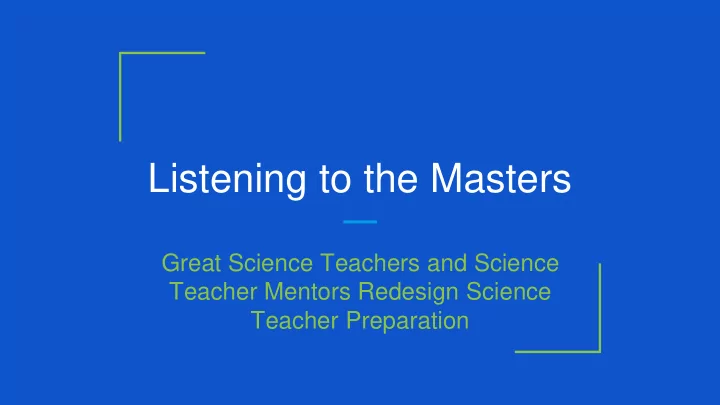

Listening to the Masters Great Science Teachers and Science Teacher Mentors Redesign Science Teacher Preparation
Presented by: Dr. Gigi Saunders, PI, Missouri State University Denise Vinton, Greenwood Laboratory School, Missouri State Univ. JoAnn Hite, Central High School, Springfield R-12 Pat Quick, Central High School, Springfield R-12 Kathy McGrane, Glendale High School, Springfield R-12
SETS: Science Experts Teaching Students A Noyce Capacity-Building Project, DUE -1240007 Goal: To design a new teacher preparation program for graduate students leading to a master’s degree. Unique in that it integrates the wealth of practical and theoretical knowledge of all SETS personnel for the preparation of quality science teachers.
Collaboration between middle school and high school science teachers, University scientists and teacher education faculty Teacher Education Faculty Middle School Teachers Student Teacher Candidates University Scientists High School Teachers
Listening to the teachers - the first year A multi-step approach: 1. An internet survey was sent to all middle and high school teachers in a 100 mile radius. 2. Focus group conversations at multiple schools in the region. 3. Nearly 70 applicants for the summer workshop. Choice made on the basis of representation of grade-level, science discipline, size and location of district and type of teacher preparation program completed. 4. Two weeks of group inquiry into science teacher preparation.
Participant Selection Facilitator, grant PIs, Missouri State University grant participants, and 22 master teachers Master teachers represented multiple paths to certification Master teachers represented a variety of district sizes, courses taught, and both middle school and high school
Summer 1 WORKSHOP 1 Standards Certification paths Working groups Culminating document
Standards NSTA Pre-Service Teacher Standards Missouri Standards for the Preparation of Educators NAAEE, NGSS, CCSS Our response
Certification Paths Preexisting: Master of Arts in Teaching Program Post Bacc Certification Undergraduate Certification A new path is needed
Working Groups/ Culminating Document Planning and Assessment Instructional Strategies Classroom Management Teaching Laboratory and Field Experiences General Knowledge of Education Pedagogical and Content Knowledge
Workshop 1: Integrate Practical and Theoretical Knowledge Consensus was reached that an apprenticeship model is best, as is learning from master teachers and teacher education faculty concurrently.
Summer 1 Workshop Results Goal of program: Teacher certification and Master’s Degree in Natural and Applied Sciences Prerequisite: Bachelor’s Degree in a science, preference for physical science major or minor Length of Program: 47 credit hours 15 months 2 summers in residence at MSU Fall and Spring semesters in school settings
Summer 2 - Curriculum Refinement and Alignment Review MoSPE, DESE and Subject Specific Competencies Begin with Critical Questions & Student Learning Objectives Individual Course Outline Descriptions Lesson/ Unit plans formatted University professor & Master teacher in mind
Foundations of Science Teaching (SCI 650) Each week the SETS students will attend classes daily: Monday - Friday 9 - 12 Monday - Wednesday 1 - 4 Friday morning session - performance assessment of the unit topic Week 1: What is Teaching? Philosophy and History of Education Week 2: Focus on Inquiry in Science Education Week 3: Focus on Assessment Week 4: Laboratory Teaching and Safety Week 5: Focus on Students Week 6: Short Term Planning and Introduction to Technology in the classroom Week 7: Curriculum Planning Week 8: School Administration
Individual Unit Plans 5E model began with SCI 650 weekly plans with activities & assessments Done to: aid in teacher assignment evaluation rubrics alignment for standards meeting the needs of student teachers & cooperating school districts
Clinical Experiences in the Teaching & Learning of Science (SCI 720) This clinical practicum course immerses teacher education candidates in professional communities in middle school and high school classrooms. Clinical work 20 hr/week fall semester. Rotation Duration I. Primary Practicum Location 3 weeks II. Specialized locations A. Literacy 2 weeks B. Special Education 2 weeks C. School Administration 1 week III. Individualized Clinical Practicum 4 weeks IV. Middle School Clinical Practicum 4 weeks
Assessment Connections: Classroom Data to Research Findings Focused inquiries- Based on Pacific University at Woodburn’s program ○ synthesis of readings from background research ○ data collected through classroom observations and interactions Answering Critical Questions: ○ Standards and Assessment Focused Inquiry ○ Learning Environments Focused Inquiry ○ Instructional Strategies Focused Inquiry ○ Special Education Focused Inquiry ○ Gifted Education Focused Inquiry ○ Literacy in the Science Classroom Focused Inquiry ○ Mathematics in the Science Classroom Focused Inquiry
Summer 3 Workshop 2 - Focus on Recruitment and Mentoring Gather middle and high school teachers, administrators, and university personnel for feedback Main goals: learn about mentoring and induction systems apply it to the design of a new teacher support system Networking system (virtual & face-to-face) develop a plan for the recruitment of future science teachers develop plan for partnerships with area schools
Next Steps- msu.sets@gmail.com Questions we need help with: Candidates How do we identify and recruit potential candidates? Does the identification process begin in the high school through our master teachers? What opportunities can we provide to measure potential success in the program and offer encouragement to the candidate? Mentoring and Induction Programs How are mentoring and induction programs implemented in other NOYCE programs? Compare and contrast participating in an induction program and working with a mentor. List the components of an effective induction program.
Recommend
More recommend